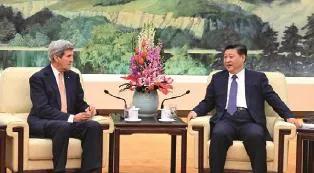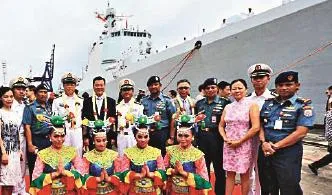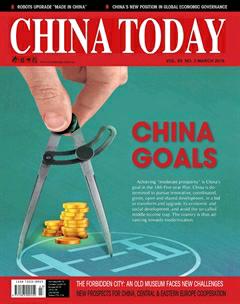Exchanges
Exchanges
Xi Jinping Meets with U.S. Secretary of State John Kerry

Chinese President Xi Jinping met with U.S. Secretary of State John Kerry on January 27, 2016 in Beijing.
Xi Jinping stressed that the healthy and stable development of China-U.S. relations was not only in the interests of both sides but also in line with the common expectation of the international community, thus China-U.S. relations should be maintained with the joint effort of the two countries. Xi said he was willing to keep close communication with President Barack Obama on major issues of common concern. The two countries should join hands to keep advancing the cooperative agenda already agreed, maintain communication and coordination on major international and regional issues as well as issues of global significance, and seek appropriate solutions to more issues. The president urged that the two countries expand cooperation in all fields at bilateral, regional, and global levels under the principles of non-conflict, nonconfrontation, mutual respect, and win-win cooperation, so as to promote bilateral relations and achieve new and greater development.
John Kerry said that U.S.-China relations are very important. The effective communication and coordination between the two countries was vital to reaching the Paris agreement on climate change and the comprehensive agreement on the Iranian nuclear issue. Kerry revealed that President Barack Obama anticipated keeping close contact with President Xi in efforts to further enhance U.S.-China relations and reinforce bilateral cooperation in international affairs.
Chinese Navy Fleet Visits Indonesia
The Chinese navy’s fleet 152 arrived in Jakarta on January 24, 2016, starting a fiveday visit, the final stop of its trip around the globe.
Chinese Ambassador to Indonesia Xie Feng, Chinese Ambassador to ASEAN Xu Bu and Eko Wahyono, deputy commander of the Main Naval Base III of Indonesia navy, attended the welcome ceremony.
In his speech, Eko said fleet 152’s visit was a great event for Indonesia, as it would promote and strengthen the friendship between the two navies. Wang Jianxun, commander of the Chinese navy fleet, said the visit would further boost the traditional friendship between the two countries, promoting cooperation between the two militaries, especially the ties between the two navies.
After the ceremony, fleet 152, composed of a missile-equipped destroyer Jinan, a missile-equipped frigate Yiyang, and an integrated supply ship Qiandaohu, was open to the public for viewing.
During the fleet’s stay in Jakarta, officers and soldiers visited a local orphanage. Wang Jianxun also met with Indonesia’s western fleet commander and Jakarta’s governor.
Chinese Premier, IMF Chief Discuss Economic and Financial Situation
Chinese Premier Li Keqiang had a telephone discussion on January 28 with International Monetary Fund (IMF) managing director Christine Lagarde at her request about the world ecomomic and financial situation.
Li said that an international consensus had emerged on the need to bolster growth, promote restructuring, and enhance cooperation. Alongside the slowdown in growth of the world economy and trade, and heightened volatility in international financial markets, China’s ability to deliver medium-high growth of 6.9 percent, solid employment, income and savings growth higher than that of gross domestic product, and steady improvement of the environment last year was no mean feat. He pointed out that reform held the key to China’s development. China would vigorously pursue structural reform, particularly supply-side structural reforms. It would continue to implement a proactive fiscal policy and prudent monetary policy, push forward the innovation-driven development strategy, and encourage mass entrepreneurship and innovation. He added that the country would press ahead with the reform of the RMB exchange rate formation mechanism in line with the principles of independence, gradualism, and controllability, enhance communication with the market, and keep the RMB exchange rate basically stable at an adaptive and equilibrium level.
Lagarde expressed confidence in the steady growth of the Chinese economy through the implementation of such effective measures as robust macro policies, structural reform, a coherent exchange rate policy, and enhanced communication with the market. She gave assurances that the IMF would step up communication and cooperation with China to jointly convey to the market their commitment to reform and confidence in growth.

China Fully Supports Uzbekistan as SCO Summit Host
Chinese Foreign Minister Wang Yi held talks with his Uzbek counterpart Abdulaziz Kamilov in Beijing on January 29, 2016.
Uzbekistan has taken over the rotating presidency of the 15-year-old Shanghai Cooperation Organization (SCO) this year. Wang Yi said China would give full support to Uzbekistan to ensure the success of the Tashkent summit later this year to display the SCO’s cooperation fruits, sum up experience and map out the future, and to jointly elevate the organization to greater role in international and regional affairs.
Kamilov said that Uzbekistan highly values China’s role in promoting the SCO’s development, and was ready to work with China and other SCO members to prepare for the summit and add impetus to the SCO’s future development. On bilateral ties, Kamilov said that Uzbekistan gave priority to developing relations with China. Uzbekistan is willing to enhance high-level contact, deepen political mutual trust, expand pragmatic cooperation with China, and actively participate in the Belt and Road Initiative, Kamilov said.
Wang said that China was willing to take the opportunity the SCO summit brings to enhance high-level exchanges, advance interconnection, capacity cooperation, and cultural exchanges with Uzbekistan within the framework of construction of the Silk Road Economic Belt to promote the China-Uzbekistan strategic partnership to a higher level.

